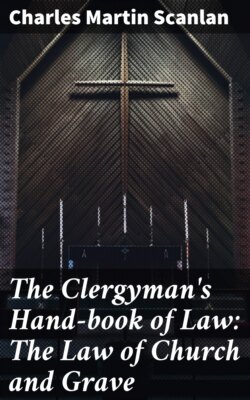Читать книгу The Clergyman's Hand-book of Law: The Law of Church and Grave - Charles Martin Scanlan - Страница 9
На сайте Литреса книга снята с продажи.
Chapter V. Unincorporated Church Societies
ОглавлениеTable of Contents
54. Partners, Debt, Liability.—Where several go into an undertaking without first being incorporated they are usually liable as partners, each one being responsible for the whole debt. In some States the same liability exists where an attempt has been made to incorporate, but there was a failure to comply fully with the law.93 There is some authority freeing the individual members of a religious society from liability for the debts of such society,94 and holding that an agent of such society could not bind the society in their associated capacity by a promissory note,95 but the rule is that the members of an unincorporated society who actively incur lawful debts or ratify them after their creation are personally liable. There are exceptions to this rule by statute or decisions [pg 046] in a few States.96 Also, the law of personal liability is settled in England.97
55. Pastor, Salary.—In a late case in Wisconsin where a pastor had a contract with his congregation as to his salary, after the clergyman's death his heirs recovered the unpaid part of his salary in an action against a few of the individual members of the congregation.98
56. Building, Materials.—The members of the building committee of an unincorporated church are liable for materials purchased by them for the church, notwithstanding that the seller charged the materials in the name of the church, and that at the time that the purchase was made, he was told that the money for payment was to be raised by subscription among the congregation.99
57. Management, Disability.—An unincorporated society is managed by those who are competent to transact their own business. Therefore, it would seem that members must be men over twenty-one years of age, and not under legal disability. The [pg 047] minor sons in a family who have continued their attendance at the religious services until of full age, are considered members.100
58. Shakers, Sect, Catholic Church, Trustees, Funds.—Although the sect called Shakers is not incorporated, yet it has been allowed to take and hold property for church purposes.101 In Massachusetts, by statute, a sect may take and hold property for religious purposes without incorporation.102 The Roman Catholic Church is a recognized public corporation by most nations, including the United States.103 No individual member of any such body has any title to the lands it holds, but the lands are the property of the society in its aggregate capacity.104 After property has been acquired, the trustees have no right to distribute it among the members, as such power could not be conferred upon them by a majority vote even when approved by an order of the court. The contributors did not intend their funds to be so disposed of, and if they failed to attain the use intended, they must be returned [pg 048] to the donors, and if not called for, would escheat to the state.105 Where an unincorporated society has purchased property and taken the title thereto in the name of one of its members, when it subsequently incorporates such member may be required to execute a conveyance to the corporation.106
59. Contract, Binding.—Persons forming a religious society may make a contract for the support of its minister by a majority vote.107 When such unincorporated society by a majority vote enters into a contract or compromises a suit, it is binding upon the minority.108
60. Court, Trust.—Any member of an unincorporated society may go into a court of equity on behalf of himself and others to enforce the execution of a trust in favor of the society.109
61. Societies, Membership, Forfeiture.—Voluntary religious societies when not restricted by their charters or articles of association, may make by-laws declaring what shall constitute membership and what shall [pg 049] operate as a forfeiture thereof, applicable to existing as well as to future members. Where money is voted to be raised by an assessment to be made at a subsequent period, a person who was a member of the religious society at the time that such vote was passed, but withdraws before the time of assessment, is not liable to taxation.110
[pg 050]
